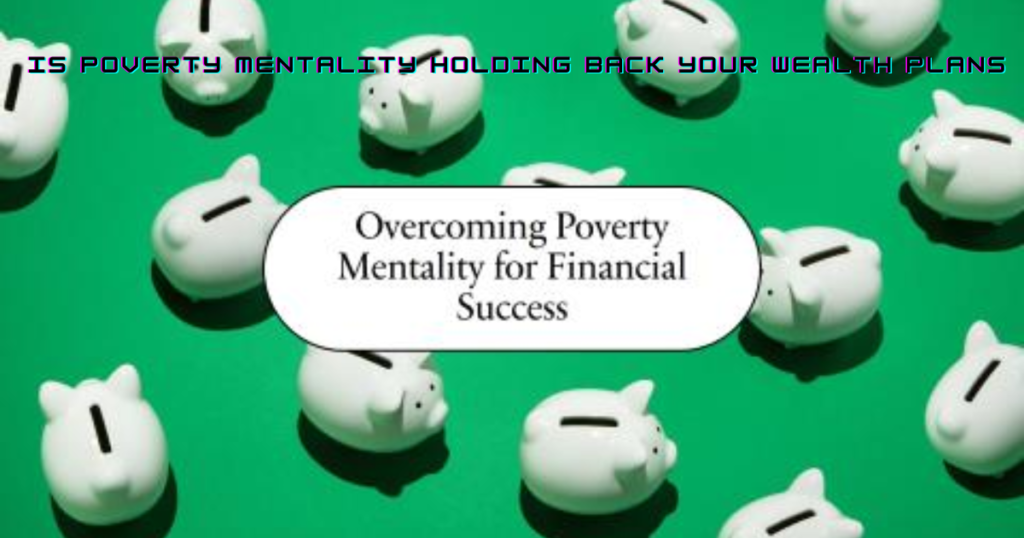Introduction
The concept of poverty mentality refers to a mindset that is characterized by a constant sense of scarcity and limitation. It’s a belief system rooted in the idea that there is never enough, and it often leads to self-sabotaging financial behaviors. This article explores the profound impact of poverty mentality on financial goals and provides actionable insights to overcome it.

Understanding Poverty Mentality
Defining Poverty Mentality
Poverty mentality is a state of mind where individuals believe they are destined to remain in financial hardship. This mindset is often the result of past experiences and societal influences that shape one’s beliefs about money and success. It manifests in various forms, such as a reluctance to spend money even on necessities. A persistent fear of financial ruin, or the belief that one does not deserve wealth.
The Psychological Grip of Scarcity
The scarcity mindset can lead to a life of financial constraints. It’s a psychological trap that convinces individuals that they are not capable of achieving more, thus hindering their financial progress. This mentality fosters a focus on short-term survival rather than long-term prosperity, often resulting in missed opportunities and a failure to invest in oneself.
The Impact of Poverty Mentality on Financial Goals

Short-Term Focus Over Long-Term Planning
Those with a poverty mentality often prioritize immediate needs over long-term financial planning, which can derail significant financial goals like retirement savings or investing in education. They may struggle to save money, as the present concerns consume their financial resources and attention.
Risk Aversion and Missed Opportunities
A fear of losing what little one has can lead to risk aversion, causing individuals to miss out on potentially lucrative investments and business opportunities. This can perpetuate the cycle of poverty, as it prevents the accumulation of wealth through calculated risks and investments.
The Cycle of Debt
A poverty mentality can lead to a cycle of debt, where individuals resort to borrowing to meet immediate needs without a clear plan for repayment. This often results in high-interest debt that can become overwhelming and further entrench the individual in financial distress.
Strategies for Overcoming Poverty Mentality
Cultivating an Abundance Mindset Shifting from a scarcity to an abundance mindset involves focusing on opportunities and possibilities rather than limitations. It requires a conscious effort to recognize and celebrate each financial success, no matter how small, and to visualize a future of financial abundance.
Setting Realistic Financial Goals
Creating achievable financial goals and breaking them down into actionable steps can help individuals move away from a poverty mentality. These goals should be specific, measurable, attainable, relevant, and time-bound (SMART), providing a clear roadmap to financial success.
Financial Literacy and Education
Educating oneself about financial management and investment strategies can empower individuals to make informed decisions. This includes understanding budgeting, saving, investing, and the wise use of credit. Knowledge is a powerful tool against the fear and uncertainty that often accompany a poverty mentality.
Seeking Professional Advice
Financial advisors can provide guidance tailored to individual circumstances, helping to navigate away from a poverty mentality. They can offer strategies for debt management, investment planning, and wealth building that customized to the individual’s unique financial situation.
Real-Life Examples of Poverty Mentality
From Scarcity to Success:
Entrepreneurial Journeys Highlighting stories of individuals who have overcome a poverty mentality to build successful businesses can serve as inspiration. These narratives often include moments of epiphany where the individual realizes the limitations of their mindset and takes bold steps to change their financial trajectory.
Case Studies: Poverty Mentality
Transforming Financial Behaviors Analyzing case studies of people who have changed their financial habits can provide practical insights into overcoming a poverty mentality. These examples showcase the strategies and mindset shifts that have led to improved financial well-being.
Conclusion
The Road to Financial Freedom Breaking free from a poverty mentality is a journey towards financial freedom. It requires a change in mindset, disciplined financial planning, and a commitment to personal growth. It’s about creating a new narrative for oneself that includes financial abundance and security. The Role of Community and Support Networks Building a supportive community can play a crucial role in helping individuals overcome a poverty mentality. This includes finding mentors, joining financial education groups, and surrounding oneself with people who have a positive outlook on money and success.
The Power of Positive Affirmations Regularly practicing positive affirmations can reinforce an abundance mindset and support financial goal achievement. Affirmations like “I am capable of achieving financial success” or “I am worthy of financial abundance” can help reshape one’s beliefs about money. Embracing Change for a Prosperous Future Ultimately, overcoming a poverty mentality is about embracing change and believing in one’s ability to achieve financial prosperity. It involves taking control of one’s financial destiny and making deliberate choices that align with one’s financial goals.
FAQs and Answer
What is a poverty mentality mindset?
- A poverty mentality mindset is a belief system characterized by a constant sense of scarcity and limitation. It leads individuals to believe they are destined to remain in financial hardship, often resulting in self-sabotaging behaviors and a fear of wealth or success.
How is wealth mentality different from poverty mentality?
- Wealth mentality characterized by an abundance mindset, where individuals believe in their ability to create and attract financial abundance. In contrast, poverty mentality is rooted in feelings of scarcity and limitation, leading to a fear of success and a reluctance to pursue opportunities for wealth.
How do you break a poverty mindset for financial abundance?
- Breaking a poverty mindset involves shifting from a scarcity mindset to an abundance mindset. This can be achieved through practices such as gratitude, visualization, affirmations, and taking proactive steps towards financial empowerment, such as setting clear goals and investing in financial education.
आप वित्तीय बहुतायत के लिए गरीबी मानसिकता को कैसे तोड़ते हैं?
- गरीबी मानसिकता को तोड़ने के लिए आपको एक बहुतायत मानसिकता की दिशा में बदलना होगा। यह आभास कराने के माध्यमों में शुक्राना, प्रतिनिधि, और वित्तीय सशक्तिकरण की दिशा में प्रोग्रेस के प्रेरणात्मक कदमों के माध्यमों में शामिल हो सकते हैं, जैसे कि स्पष्ट लक्ष्य निर्धारित करना और वित्तीय शिक्षा में निवेश।
Disclaimer
This article relies on internal data, publicly available information, and other reliable sources. It may also include the authors’ personal views. However, it’s essential to note that the information is for general, educational, and awareness purposes only—it doesn’t disclose every material fact. This analysis is for informational purposes only and does not constitute financial advice. Consult a professional before making investment decisions.
We publish information on World Virtual CFO in good faith, solely for general information. World Virtual CFO doesn’t guarantee the completeness, reliability, or accuracy of this information. These are our views for informational purposes. When you use our website, know that any action you take is entirely at your own risk. World Virtual CFO won’t be liable for any losses or damages connected to your use of our website. For detailed information, refer to our disclaimer page.
Dr. Dinesh Sharma is an award-winning CFO and AI strategist with over two decades of experience in financial leadership, digital transformation, and business optimization. As the founder of multiple niche platforms—including WorldVirtualCFO.com—he empowers professionals and organizations with strategic insights, system structuring, and innovative tools for sustainable growth. His blogs and e-books blend precision with vision, making complex financial and technological concepts accessible and actionable.